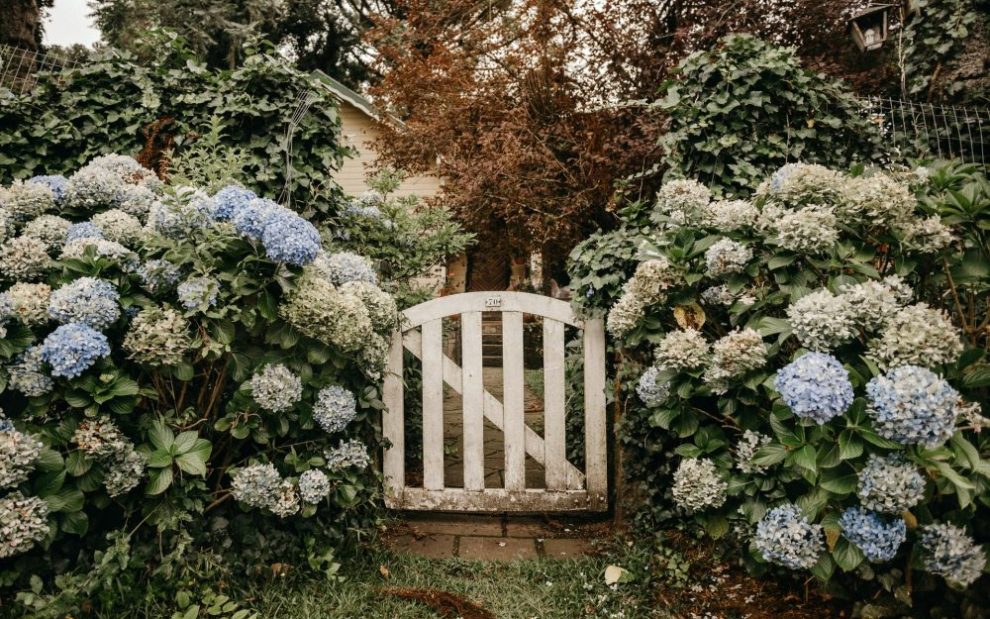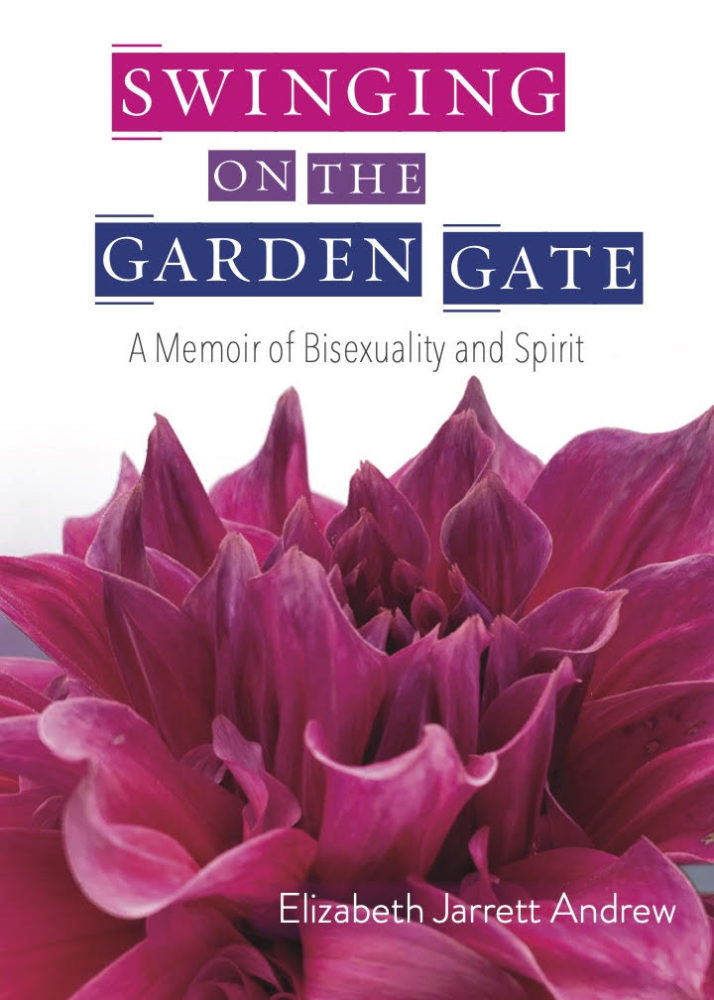Swinging on the Garden Gate
By Elizabeth Jarrett Andrew (Skinner House Books, 2022)
I almost cried several times while reading Swinging on the Garden Gate.
Not because it is a sad book. Well, I guess it was sad at times—every memoir is, after all. But mostly I wanted to cry because this book soothed something inside of me. It felt holy—as though the author had held out a piece of her heart and said, “Here, this is for you.”
When I first received a copy of the book, I almost couldn’t believe my eyes. I’d never encountered a memoir of bisexuality, especially not a religious one, and wasn’t sure what to expect when I opened the first page. It’s not a “fix-it” or “How to Deal with Being Bisexual 101” type of book. It’s more like a poem or song that ebbs and flows with the joys and griefs of Elizabeth Jarrett Andrew’s life. The book is a kind of accompaniment, a warm hand that holds ours and invites us to walk with her.
The language Andrew uses is lyrical and evocative. When she stands looking over a mountainside, she writes, “In my lungs the air was clear; in my mouth I tasted autumn.” She describes digging her hands into the pole beans of her garden: “When I brush the leaves with an arm or my back, the dead ones press their sticky palms to my jacket.” The book is filled with language that feels deeply, inviting us to feel deeply as well.
Within its pages, Andrew is utterly vulnerable. She tells of a little girl, obsessed with King Arthur and medieval knights, hiding away in a fantasy world that allowed her to be everything she dreamed. She tells of a vibrant, wild spirituality that filled the little girl and made her long to dance through the aisles of her church and shout to the hills, a spirituality like that of Anne of Green Gables, who desired to stand in a great field and just “feel a prayer.”
She shows the little girl constricted by rigid church rules and societal expectations, pushed to the margins of school life, alienated from the “normal” desires of her peers, afraid of her body, and searching for meaning. The little girl dreamed of a swing: “If I could reach the height where, leaning back, all I saw was afternoon blue, I believed I would fly up into that sky world. In this fantasy place there were no rules; there I could be the beautiful, magical girl I most desired to be.” In a society where no place was left for her, the little girl dreamed of somewhere she could be free.
My hands shook when I read this section. Andrew is not only telling her story, she is telling mine too. Pigeonholed by a religion that felt unrelatable and relationships that felt unfulfilling, we hid ourselves away, just two little girls dreaming of dragons. I had never seen myself on a page like this before.
Andrew shares how she spent her college years journeying across the world, burnt out and hollow but learning to harbor new growth. For the first time, she begins to meet herself, to grieve for the little girl. She sleeps for days and spends the rest of the time biking across the country, meeting God in the mountains and ravines. And she begins to find God within herself: “The body I turned my back on and ran from in panic was my body, a holy vessel. . . . In the end I was no longer afraid to touch her.” I see within her my young adult self, trapped at a religious college where the air felt like liquid lead and God felt unknowable. When I escaped that school, I too slept for days and began to encounter God in new ways.
Then finally, Andrew takes the plunge. She cracks open the door of the secret garden and begins to let people in. She utters the word bisexual about herself. We hold Andrew’s hand as she faces those she loves and releases what is soft and vulnerable within her like a “swift chain reaction until everything burns, the core’s substance brilliantly exposed to the vastness of space.” She comes out to her spiritual mentor, her parents, her friends, and even her congregation, letting out her secret and finding herself freer than before.
With flowing prose, Andrew shows us that it’s OK to dream, that we can encounter God exactly where we are at—not within the confines of rigid religious mores but out in the mud and vines of everyday life. She professes the God “we live, day in and day out—the one who determines our practice of the ignominious word ‘lifestyle.’ ” She finds that little girl who wanted to dance through the church aisles, and she lets her dance. She embraces God and her body in a beautifully spiritual harmony and “resolve[s] to come out in the fullest sense, not just by calling myself bisexual but by attending to all my dreams, all dimensions of my deepest self.”
I found myself staring at the book in disbelief. Here is a woman who is like me. Yet here is a woman who journeys to meet herself and God and finds what she is looking for. Yes, she has her share of griefs and hardships, but she can look at herself and see—she knows who she is and how she relates to God.
Within that knowledge, she finds something more. She describes standing in a bookstore and searching the shelves vainly for a book on bisexuality: “If I could find this book, I was convinced, I’d be less lonely and more confident of my sanity. It would be my companion during difficult times. . . . The gap on the bookshelves gave me a mandate: Walk into your longing. Write this book.” Among the dusty shelves of the bookstore, she finds her vocation: to be a companion, to stand in the literature gap and reach to the margins.
“Within a story, the details are what leap from the teller’s to the listener’s heart,” Andrew writes. And she is right—she shows me I can dream. With the incredible gift of her memoir, she shows me that I’m not alone, that we’re all trying to find our way in this society full of restrictions and loneliness. She reaches through the pages and finds me sitting with eyes full of tears. She shows me that we can honor the little girls lost in fantasy, the young people sleeping for days to heal, the adults looking for ways to find God within bodies we were taught to hate. She opens the garden gate and invites us in. We are safe.
Andrew closes by speaking directly to us readers: “There is a soul we all share that needs to be fed. It is aching for your story, for its emotional truths and its flights of fancy, because you must love yourself with leaps and bounds in order to have the courage to tell it. And this is what it aches for most of all.”
Thank you, Elizabeth Jarrett Andrew, for inviting us to see and love ourselves—bisexuality and all.
Image: Unsplash/Jonathan Borba
















Add comment